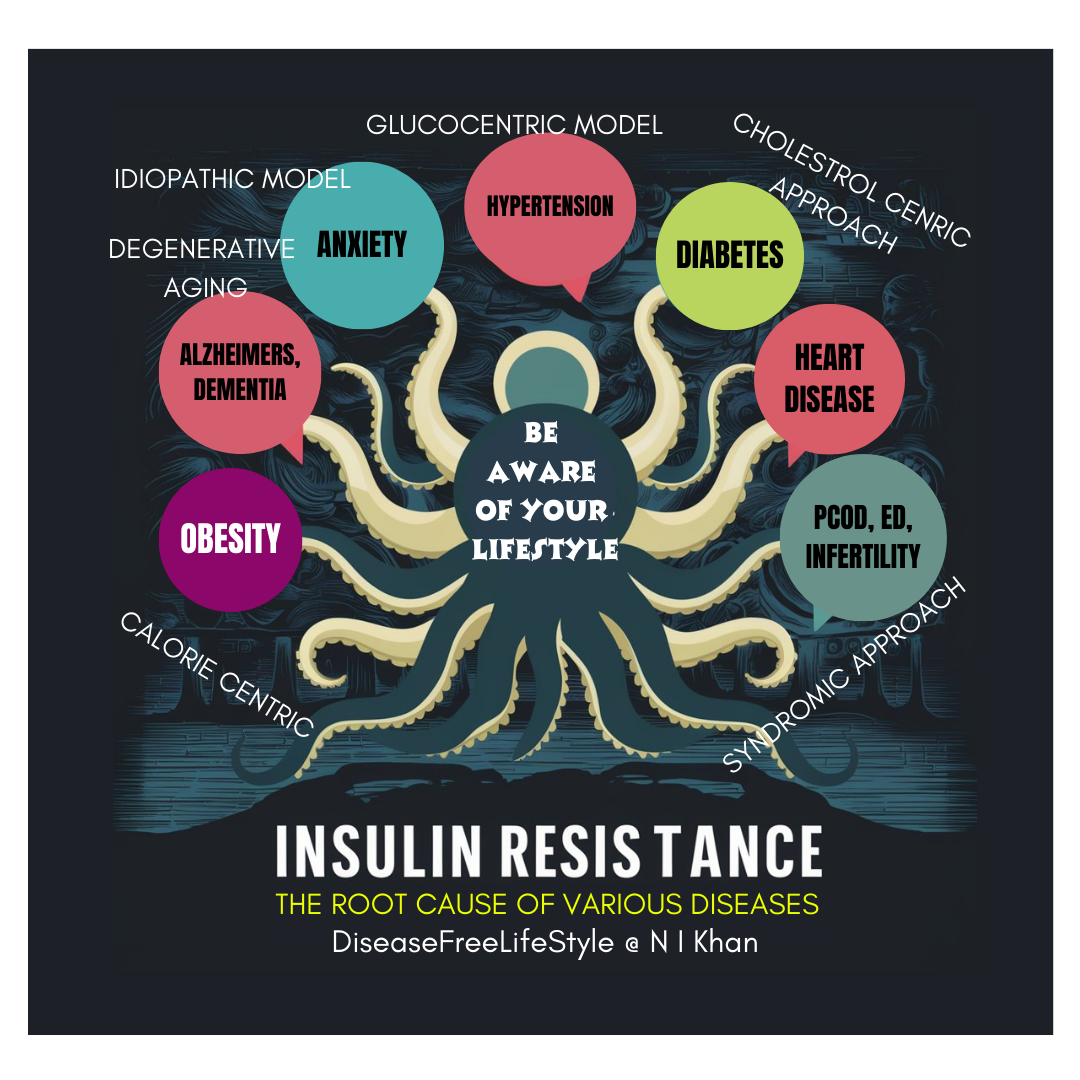Insulin Resistance in your body is a silent killer. In today’s fast-paced world, where junk food and sedentary lifestyles have become the norm, it’s no surprise that many people are facing health issues. From obesity to diabetes, heart disease to depression. The list of ailments seems never-ending. However, what if I told you that there is one underlying core factor that connects all these diseases? The answer may lie in an often-overlooked hormone called insulin, I mean “Excess Insulin in the blood or Insulin Resistance”.
You must know about Insulin and Insulin Resistance:
Insulin, a constructive hormone produced by the pancreas, plays a crucial role in regulating blood sugar levels. Its primary function is to facilitate the absorption of glucose into our cells, providing them with the energy they need to function optimally. However, when we consume food, especially those high in carbohydrates including junk foods or fast food, our bodies are bombarded with high levels of glucose. In response, the pancreas releases insulin to help transport glucose into our cells, where it can be used for energy. This process is essential for our survival.
The problem arises when this excess insulin remains consistently in our bloodstream for prolonged periods. It is called Insulin Resistance. This condition, known as hyperinsulinemia, can have severe consequences for our health. Research has shown that excess insulin in the blood is the root cause of many diseases, including, inflammation, obesity, diabetes, allergy, and cardiovascular issues.
The primary culprit behind insulin resistance is our modern diet, filled with junk food and fast food. These highly processed foods are often loaded with refined sugars, unhealthy fats, and empty calories. When we consume these foods, our bodies experience a rapid spike in blood sugar levels. In response, the pancreas releases a surge of insulin to bring those sugar levels back down. Unfortunately, this constant cycle of blood sugar spikes and insulin surges can lead to insulin resistance. Over time, our cells become less responsive to insulin’s signal, causing the pancreas to produce even more insulin. This excess insulin not only promotes the storage of fat but also contributes to a host of other health problems.
One of the most significant consequences of excess insulin is weight gain and obesity. Insulin is a fat-storing hormone, and when levels are consistently high, our bodies are in constant fat-storage mode. This makes it incredibly difficult to lose weight, even with a balanced diet and regular exercise. Moreover, excess weight puts additional stress on our organs, increasing the risk of heart disease, high blood pressure, and other cardiovascular issues.
But the detrimental effects of excess insulin don’t stop there. Research has shown a strong link between insulin resistance and sleeplessness. When insulin levels are imbalanced, it can disrupt our sleep patterns, leading to insomnia and poor-quality sleep. Lack of sleep, in turn, can further exacerbate insulin resistance, creating a vicious cycle that is challenging to break.
Furthermore, excess insulin has been associated with mental health conditions such as depression and anxiety. Studies have found a correlation between insulin resistance and increased rates of depression. The exact mechanisms behind this connection are still being explored, but it is believed that insulin resistance affects the brain’s neurotransmitters and disrupts mood-regulating processes.
Let’s know how we can combat this excess of insulin in our bodies and prevent the onset of these diseases.
A Holistic Approach to Our Health.
Balanced Diet:
First and foremost, a balanced diet is crucial. It is one of the most effective ways to combat hyperinsulinemia. By reducing our intake of junk food and fast food, and by incorporating nutrient-rich foods into our meals, we can minimize blood sugar spikes and subsequently lower insulin levels. Opting for whole, unprocessed foods including plenty of fruits, vegetables, whole grains, lean proteins, rich in fiber, and healthy fats can help stabilize blood sugar levels and promote insulin sensitivity.
Regular exercise is another key component in maintaining insulin balance. Engaging in physical activity helps our cells become more responsive to insulin, improving insulin sensitivity and reducing the need for excess insulin production. Whether it’s hitting the gym, going for a run, engaging in a variety of activities, such as cardio, strength training, and flexibility exercises can have a positive and profound impact on our insulin levels that helps for our overall health and well-being.
Morning Walking:
Speaking of walks, a morning stroll can do wonders for our overall well-being. A brisk walk in the fresh air not only helps to burn calories but also activates the parasympathetic nervous system, which aids in reducing stress and promoting relaxation. By kick starting our day with a morning walk, we can set a positive tone for the rest of the day, both physically and mentally.
Quality Sleep
Quality sleep is often underestimated but plays a vital role in insulin regulation. Sleeplessness and irregular sleep patterns disrupt the body’s natural hormone regulation, including insulin production. Establishing a consistent sleep schedule, creating a calming bedtime routine, and ensuring a comfortable sleep environment can contribute to better sleep quality. By prioritizing a consistent sleep schedule and creating a relaxing bedtime routine, we can break the cycle of sleeplessness and insulin resistance. Thus, we can ensure that our bodies have the time they need to restore and regulate insulin levels promoting overall metabolic health.
Mindfulness
Practicing mindfulness is another powerful tool in combating hyperinsulinemia. By practicing mindfulness techniques such as meditation or deep breathing exercises and yoga, we can reduce stress levels and activate the parasympathetic nervous system. This shift from the “fight-or-flight” sympathetic activities to the calming parasympathetic activities can help regulate insulin production and promote overall well-being.
Autophagy:
Lastly, a fascinating process called autophagy can also play a role in maintaining insulin balance. Autophagy is the body’s way of recycling damaged or dysfunctional cells, allowing for cellular rejuvenation. By incorporating intermittent fasting or time-restricted eating into our routine, we can stimulate autophagy and support insulin regulation.
Conclusion
In conclusion, excess insulin in the blood or Insulin Resistance is indeed the root cause of many diseases plaguing our society today. By adopting a balanced diet, engaging in regular exercise, going for a morning walk, prioritizing quality sleep, practicing mindfulness, and incorporating autophagy-inducing techniques, we can take significant steps towards maintaining a healthy insulin balance. It’s time to break free from the clutches of junk food, sedentary lifestyles, and crazy curbs, and embrace a holistic approach to our well-being. Let’s reclaim our health and live our lives to the fullest! It’s time to make conscious choices and prioritize our well-being, for a healthier and happier future.
N.B:
This article is for informational purposes only and should not be considered as medical advice. Always consult with a healthcare professional before making any changes to your lifestyle or treatment plan.










